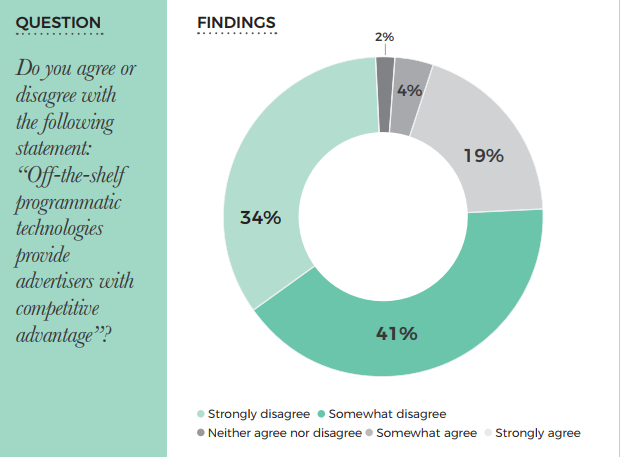 Research from Infectious Media conducted by third-party research first Qualtrics released today founds that while the majority of advertisers (84 percent) want more control over their programmatic buying, only 1.4 percent have actually taken it in-house. Advertisers seem frustrated with agencies, with 71 percent saying they believe agencies have struggled to adapt to programmatic advertising, but there ares still significant blocks to in-housing and the vast majority of advertisers would favour a hybrid approach in the future where agencies still play a role.
Research from Infectious Media conducted by third-party research first Qualtrics released today founds that while the majority of advertisers (84 percent) want more control over their programmatic buying, only 1.4 percent have actually taken it in-house. Advertisers seem frustrated with agencies, with 71 percent saying they believe agencies have struggled to adapt to programmatic advertising, but there ares still significant blocks to in-housing and the vast majority of advertisers would favour a hybrid approach in the future where agencies still play a role.
Infectious Media’s report surveyed 214 brand advertisers who have responsibility for their brand’s programmatic advertising and programmatic budgets of over $100k per year, gauging their views on programmatic. The most challenging aspects of programmatic advertising listed by participants are familiar gripes; 66 percent find publisher relationships either completely or very challenging, 66 percent say the same about financial transparency, and 63 percent about data transparency. It is this lack of information, over where their ads are being displayed and what exactly their money is paying for, that is driving advertisers to seek more control over their programmatic buying.
Advertisers hold agencies responsible for this, and it appears to have fractured relationships between the two, with 53 percent of advertisers reporting that they feel agencies lack trustworthiness. Seventy-five percent said that media agencies have found reporting financial data either completely or very challenging, and 72 percent said the same about accurate measurement of programmatic.
The advertisers surveyed also said they are unimpressed with the programmatic tech their agencies offer them. Seventy-seven percent of respondents said their media agencies use programmatic technology that is available elsewhere, and 75 percent said they don’t think off-the-shelf programmatic tech gives them a competitive advantage.
Despite this dissatisfaction, only 1.4 percent of respondents have actually taken their programmatic buying in house (by their own definition of in-house). This might partly be attributed to the commonly cited blocks to in-housing: 71 percent said more availability of qualified staff is a very or extremely important factor in the decision to in-house, with 69 percent citing advances in DSP capabilities as also very important. A lack of programmatic talent is often talked about as one of the main reasons brands will struggle to work independent of agencies.
Not to say that if these blocks are removed, all advertisers will want to handle programmatic fully in house. Around 96 percent see the need for agency help in multiple areas and on average advertisers would like to see 46 percent of programmatic work handles by advertisers in their ideal setup, suggesting that model of the future might still see agencies and advertisers working together, just with more power shifted towards the advertisers. “There’s a real opportunity for agencies to meet advertiser need by adapting to a more hybrid approach” said Infectious Media CEO and co-founder Martin Kelly. “We see the future of the media agency being modular. The agency will have all the capabilities the client needs, but brands will look at their business and recognise where they are already strong, and where they need outsourced help.”
Other research released today further demonstrated frustrations with the current digital landscape. Research from outstream specialist Teads found that 95 percent of brand CMOs say they’ve overhauled their digital strategies in the last year in light of concerns around transparency, fraud and brand safety, with 44 percent reviewing relationships with their suppliers. But Teads’ global VP of client partnerships Marc Zander believes there’s still much more action to be taken, commenting at Teads’ Outstream summit that it’s more likely the 95 percent who claim to have overhauled their digital strategy are more likely to have just enquired about what their digital strategy actually is.





